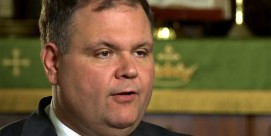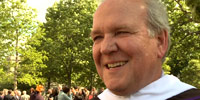In This Episode << SLIDE LEFT TO SEE ADDITIONAL SEGMENTS
Election 2000 – The Jewish Vote
BOB ABERNETHY, anchor: U.S. Relations with Israel is a key policy concern for American Jewish voters. This week, we begin a special series of reports about religion and the upcoming election. In part one, Kim Lawton takes a look at the impact of Senator Lieberman’s candidacy on the Jewish community.
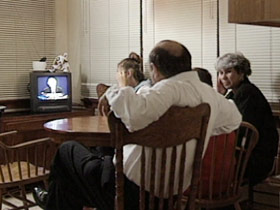
KIM LAWTON: In Washington, D.C., members of the Brandenburg family watched the vice-presidential debates with interest and with pride. For the first time ever, one of those on the platform shared their Jewish faith. The Brandenburgs say they’ve never been much interested in politics. But the Lieberman candidacy has ignited something new.
10-year-old Hilary has been particularly captivated.
HILARY BRANDENBURG: I think he’s really cool because he’s the first Jewish vice president running and he’s a great guy.
LAWTON: Political persuasions aside, most Jews agree this indeed has been a highly symbolic moment.
RABBI DAVID SAPERSTEIN (Religious Action Center of Reform Judaism): It represents a sea change in America. It represents the promise of America that here, truly, we would have the same rights, the same freedoms, the same responsibilities, and be able to play out those responsibilities as [does] every other American citizen.
LAWTON: Jews represent just over two percent of the U.S. population. But they’ve become a key voting bloc, sought after by candidates across the political spectrum.
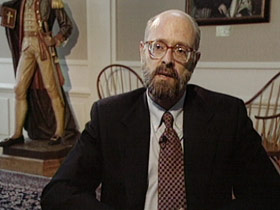
Professor ALAN MITTLEMAN (Muhlenberg College): They’re a highly educated community, a highly professional community, and, to be honest, a largely middle- and upper-middle-class community. They’re also quite philanthropic and politically oriented, so they tend to have an effect on culture, on society, and on politics in excess of their raw numbers.
LAWTON: Jewish political activism in the United States grew out of the immigrant experience. Like many other immigrant groups, Jewish immigrants identified with the Democratic Party, which they saw as more responsive to their social needs. Today, more than 70 percent are still registered Democrats.
But Republicans are also attempting to make inroads.
RABBI SAPERSTEIN: Jews are not knee-jerk in their reaction, and it only takes a shift of five or 10 percent to shift a lot of votes in some of the big electoral states — Florida, New York, California, Illinois, Pennsylvania, Massachusetts — where a lot of Jewish votes are disproportionately found.
LAWTON: Politically conservative groups such as “Toward Tradition” argue that the Jewish community is increasingly adopting conservative social and political values.
RABBI DANIEL LAPIN (Toward Tradition): There is no such thing as a monolithic voice in the Jewish community. It simply doesn’t exist.
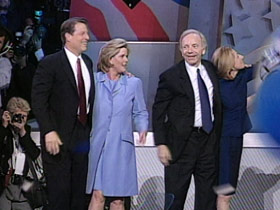
LAWTON: Professor Alan Mittleman is working on a project called Jews in the American Public Square, which is currently studying Jewish political trends.
PROFESSOR MITTLEMAN: Jews remain largely a liberal community, but on issues that come very close to home — law and order issues, crime, for example — they are willing to vote for people outside the Democratic Party.
LAWTON: According to polls, more than 90 percent of Jews voted for Bill Clinton in 1996. The addition of Joe Lieberman has shored up Democratic loyalty going into this election. Some say it’s also prompting political re-thinking in the Jewish community, re-thinking that could have repercussions well beyond November.
For some, Lieberman is challenging stereotypes of what it means to be a religious Jew.
MS. BETTY EHRENBERG (Union of Orthodox Jewish Congregations of America): I think for the most part, the Orthodox Jewish community is very fascinated by the idea that someone who is an observant Jew has been chosen as a candidate. But I think it’s also seen as an opportunity for people to understand more about Orthodox Judaism than has been understood previously.
LAWTON: Jews from many traditions say Lieberman’s candidacy is also challenging the notion that religion and politics belong in separate realms.
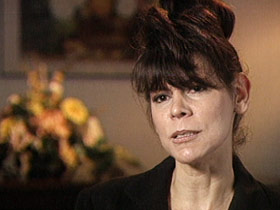
MARK DAVIS: That a person could be in [this] world, could be modern, could be in business and politics, and yet still abide by his religion or her religion, and I think that’s the thing about Lieberman that makes me the most proud.
LAWTON: Some Jews are concerned Lieberman’s visibility as an observant Jew could stir up latent anti-Semitic feelings and provoke a backlash against the entire community. But others believe it can also be a catalyst for a new day.
MS. EHRENBERG: Those who are anti-Semitic exist. They are always there. They will always be there. If they come out to the light and the sunshine, now we’ll know who they are exactly and they will not be hidden any more. I think it will increase anti-Semitism in any way and I feel that only positive can really come of this.
LAWTON: Professor Mittleman asserts that many American Jews have not made the connection between their public policy positions and the religious beliefs that may have led to those positions. Lieberman, he says, offers a new image.
PROFESSOR MITTLEMAN: Jews are very comfortable talking about social progress and social justice and sort of large liberal ideals which they hook up to their prophetic tradition. But they don’t like to descend into the specifics of how their faith and their traditional practices might impact on their civic engagement.
LAWTON: But such discussions are already yielding controversy within the community. Some political conservatives are frustrated that Lieberman talks about religion and family values, and yet supports abortion and gay rights.
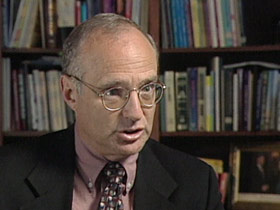
RABBI LAPIN: There is another wing of the Jewish community, the more observant wing of the community, who is less comfortable also with the gap between the things that the senator says and the way he actually votes.
LAWTON: Some liberals have been alarmed by Lieberman’s views about the role of religion in public life, for example, his comments at a black church that freedom of religion doesn’t mean freedom from religion.
Most Jews have traditionally supported a strict separation between church and state.
RABBI SAPERSTEIN: Jews have benefited extraordinarily by America’s separation of church and state. Keeping the government out of religion has allowed religion to flourish with a diversity and strength in American unmatched anywhere in the Western world.
PROFESSOR MITTLEMAN: I believe that Senator Lieberman’s presence on the ticket will cause a lot of soul-searching and rethinking in the Jewish community on some of the core church-state issues.
LAWTON: The immediate impact of the Lieberman candidacy has been to energize Jewish families such as the Brandenburgs to get more involved in politics. Fani Brandenburg says her family is still thinking through the implications of their faith for their politics. But she says the clear message of this campaign for her daughters is that their Jewish faith can be an asset, whatever their future holds.
FANI BRANDENBURG: The door’s wide open. This is truly the American dream.
LAWTON: I’m Kim Lawton in Washington.

